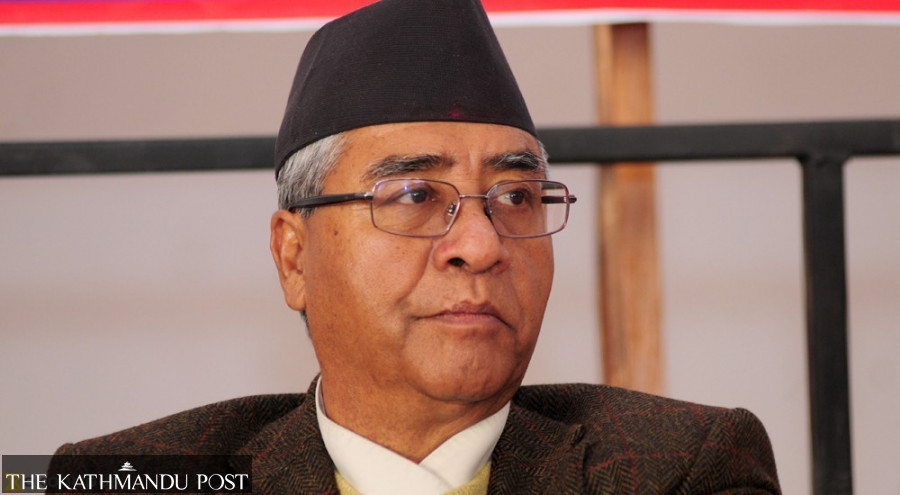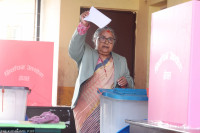Politics
Nepal helped Deuba return to power. Now he’s hobbling Cabinet expansion
Even three weeks after assuming office, prime minister is unable to expand the Cabinet. Allotment of ministries delayed as UML dissidents who voted for Deuba vacillate.
Anil Giri
On Tuesday, Sher Bahadur Tamang, a lawmaker from the main opposition CPN–UML, took a dig at Prime Minister Sher Bahadur Deuba, asking him to “take a tuition or coaching class” on how to run the government.
“It has been three weeks since the new government came into being, but it has yet to get a full shape,” said Tamang while speaking in the House. “The five-time prime minister has yet to expand his Cabinet. Does he need a coaching class from us?”
Tamang’s jibe at Deuba is something almost everyone is talking about.
Even three weeks after taking the oath of office, Deuba has not been able to expand his Cabinet, and he has been running the government with four ministers and one minister of state, just as the country is in the midst of the Covid-19 pandemic.
“The reason behind the delay in expanding the Cabinet is that we have been waiting for the Madhav Kumar Nepal faction to decide,” said a Nepali Congress leader. “Cabinet expansion is unlikely before Friday.”
After the Supreme Court on July 12 ordered that Deuba be appointed prime minister, ousting KP Sharma Oli, the Congress leader on July 18 went for a floor test in Parliament.
As many as 14 lawmakers from the Nepal faction of the UML had voted for Deuba, who garnered 165 votes to win the House confidence. But Nepal, who has his own axe to grind with Oli, has hemmed and hawed, not giving a clear answer to the Congress party that is leading a coalition government with the support of the Communist Party of Nepal (Maoist Centre) and the Janata Samajbadi Party.
The Congress-Maoist alliance has made an offer to leaders of the Nepal faction to join the government, but the dissidents in the UML are trying to strike a deal with Oli.
“One day, the Nepal faction seems positive about joining the government and the next day it expresses its unwillingness,” said the Congress leader. “This has created confusion about portfolio distribution.”
Besides 14 Nepal faction lawmakers, eight others from the UML, considered close to Oli, too had voted for Deuba, and they are also seen as aspirants for some portfolios.
While Deuba has to distribute ministries to his coalition partners and others who supported him during the confidence vote, he also needs to take care of the factions within his own party led by Ram Chandra Poudel and Krishna Prasad Sitaula.
Deuba’s tale of woes doesn’t end here. Under pressure, he has not been able to come up with a common minimum programme.
A task force formed by the ruling parties on Tuesday readied a draft of the common minimum programme and is going to submit it on Wednesday morning with some suggestions to the government, according to one member.
Sources familiar with the matter said the common minimum programme is most likely to be made public on Wednesday.
The task force is headed by Nepali Congress General Secretary Purna Bahadur Khadka, which has Ramesh Lekhak and Minendra Rijal from the Congress party, Barsha Man Pun and Dev Gurung from the Maoist Centre, and Rajendra Shrestha and Mahendra Raya Yadav from the Janata Samajbadi Party as members.
“Our plan is to give full shape to the Cabinet expansion at one go. That is why it is getting delayed,” said Narayan Kaji Shrestha, spokesperson for the Maoist Centre.
Even if the Congress-Maoist alliance comes up with the common minimum programme, Deuba’s struggle to expand the Cabinet is likely to continue for a few more days.
The common minimum programme, or CMP, is a tradition practised in Nepal whenever a new government is formed. The CMP sets the priorities of the government and talks about what it wants to achieve. This, however, becomes a complicated process when there is a coalition government, as it has to address the issues of the partners supporting it.
Now that the CMP has been almost finalised, it’s the Nepal faction that is delaying the Cabinet expansion, leaders say.
The ruling coalition not only wants to assign some ministries to the faction but also is in talks about appointing Nepal as the coordinator of a high-level political mechanism, which will advise the government.
Another leader from the Nepali Congress said Nepal’s indecision has made things complicated, as he has been in talks with his party chair Oli as well. Nepal has yet to make up his mind whether he really wants to part ways with Oli, even though bitterness between the two leaders has grown.
Oli considers Nepal a “betrayer” for supporting Deuba. Oli has even branded Nepal a traitor and said there is no place for people like Nepal in the party. Despite that, Oli has not closed the door for Nepal to remain in the party. Nepal himself has been vacillating; he has not been able to decide whether to quit the UML and form a new party of his own.
Insiders say Nepal is also looking for the chair in the UML, on par with Oli, and if the latter agrees to that, the former could decide not to continue his support to the Congress-Maoist alliance. Immediately after the court order to appoint Deuba the prime minister, Nepal had declared that the relevance of his association with the Congress-Maoist alliance had ended as it was meant to bring down the “Oli tendency.”
Insiders say now that the taskforce has come up with the CMP, it depends on the Nepal faction how the Congress-Maoist alliance decides on expanding the Cabinet.
“If Oli and Nepal fail to patch up their differences, Nepal should make a concrete decision and let us know,” said the Congress leader who did not wish to be named saying negotiations are still underway. “If Nepal decides to break his ties with the UML, he can head the political mechanism that the ruling alliance is considering.”
The political mechanism is one of the recommendations of the taskforce, which is envisioned as an advisory committee to help the government to function effectively and smoothly.
Mahendra Raya Yadav, a member of the taskforce, told the Post their report is ready and that it’s up to the leadership of the ruling coalition to decide.
According to another member of the taskforce, it has also recommended scrapping some political appointments of the Oli government, including the chief election commissioner and chief commissioner of the Commission for Investigation of Abuse of Authority.
Former home secretary Prem Kumar Rai was appointed chief of the anti-graft agency on February 3 while Dinesh Thapaliya was appointed chief election commissioner in April, 2019.
Rai’s appointment was made after the Oli government introduced an ordinance to amend the Constitution Council Act-2010 on December 20 last year. The Deuba government has already repealed the ordinance, as per which more than 50 appointments have been made. The appointments, however, have been challenged in the court.
At present, there are two ministers from the Nepali Congress and as many from the Maoist Centre in the Deuba Cabinet. Deuba on July 25 appointed Umesh Shrestha as state minister for health, for which he has drawn a lot of flak. Even within the Janata Samajbadi Party, there are two factions led by Upendra Yadav and Mahantha Thakur.
The Janata Samajbadi Party is certain to get at least four-five portfolios, but Deuba will have a tough time, as there needs to be clarity on factional feud in the party.
According to a member of the ruling coalition task force, it can advise the leadership on broader issues, but it cannot take a decision on distribution of ministerial portfolios. “The top leadership has to work it out,” he said.
Deuba’s failure to expand his Cabinet even three weeks after taking over the reins reflects badly on him. He is known as a master at running a coalition government—he has set records of leading the largest Council of Ministers in the past—but the present constitution has limited the number of ministers to 25.
Ruling party leaders hope that with the common minimum programme almost finalised, the Cabinet expansion should not be an issue now, as long as the Nepal faction takes decision.
“It will take another two to three days to expand the Cabinet,” said Shrestha of the Maoist Centre.




 27.41°C Kathmandu
27.41°C Kathmandu













